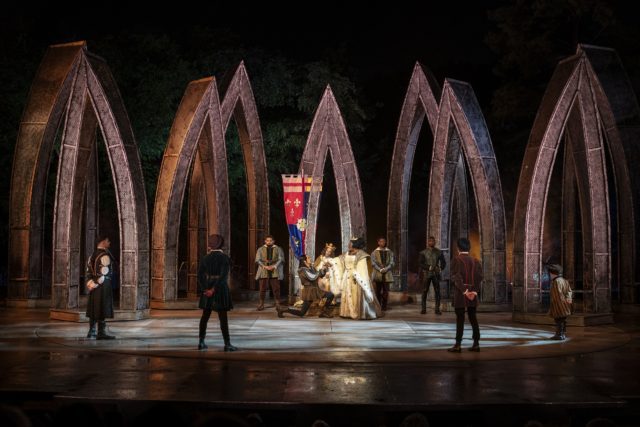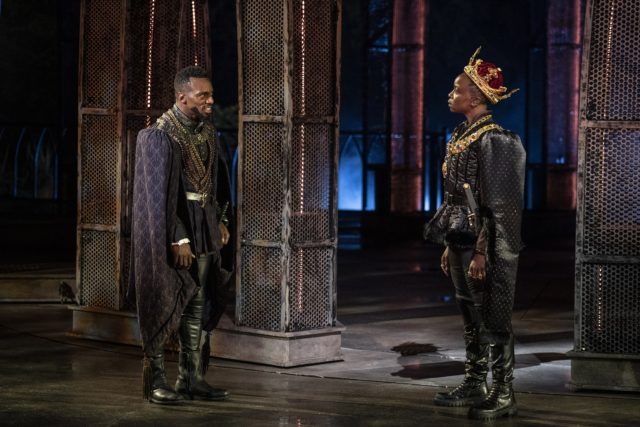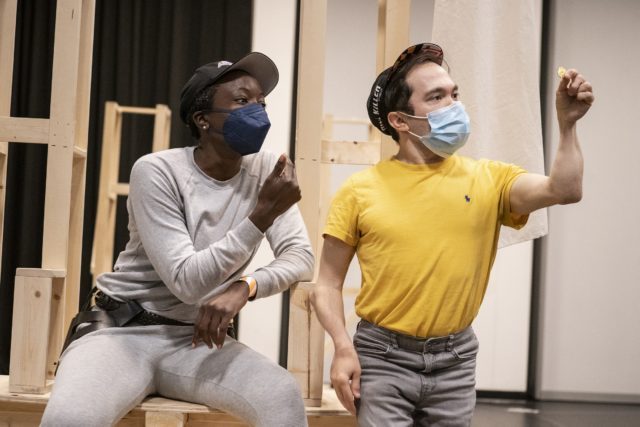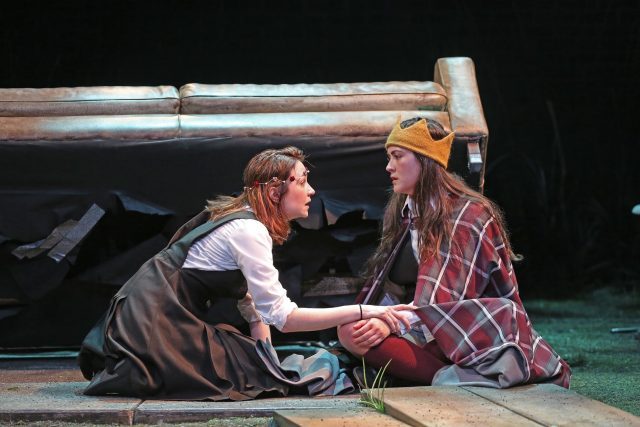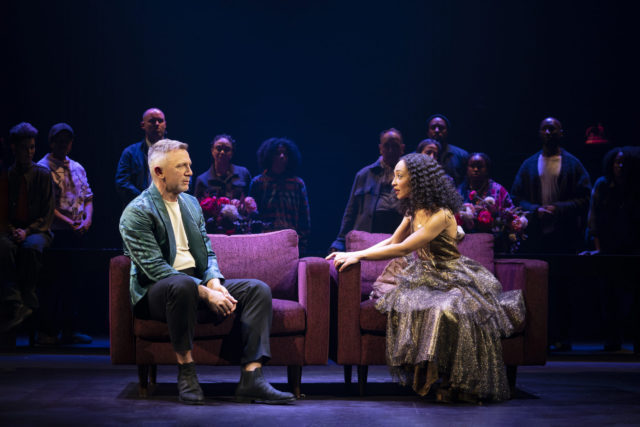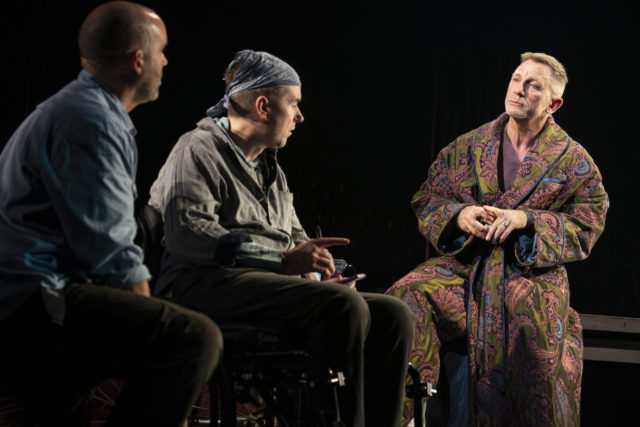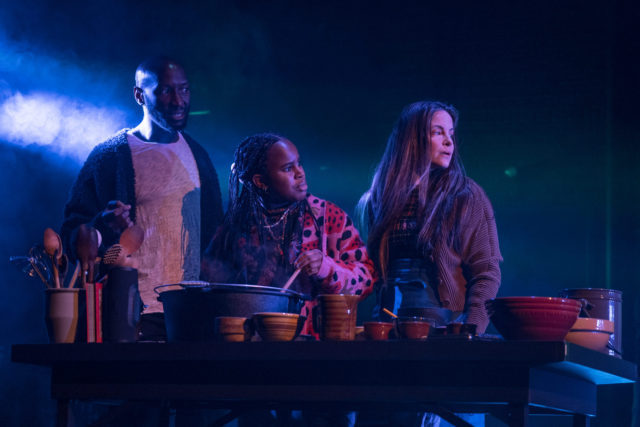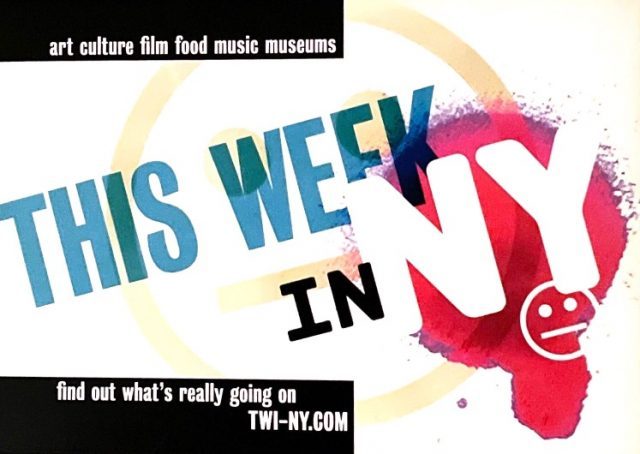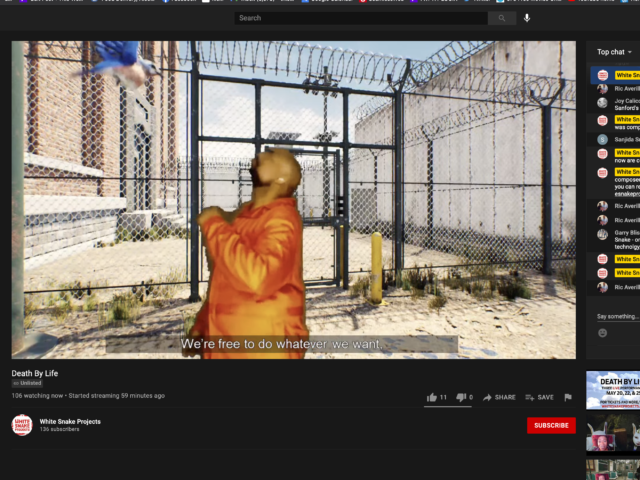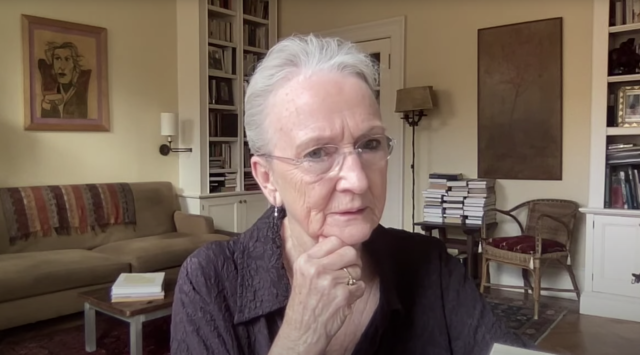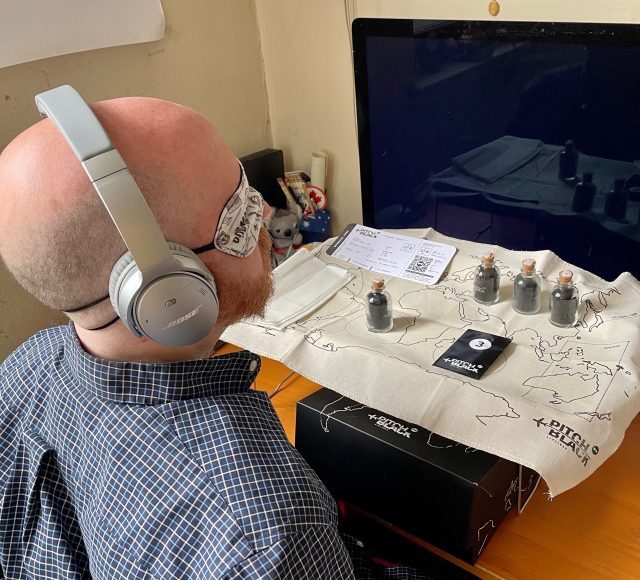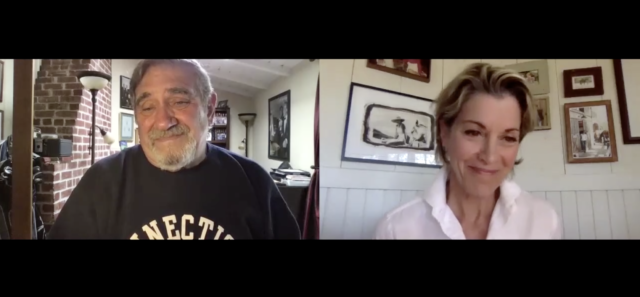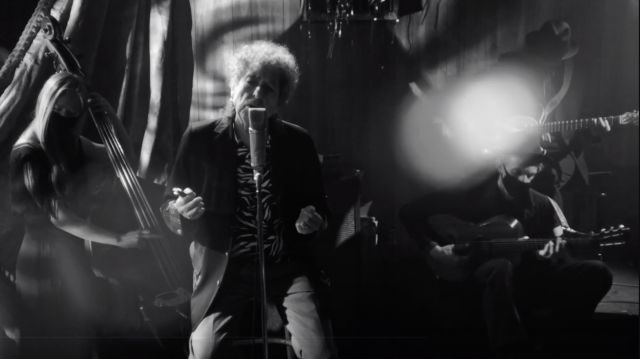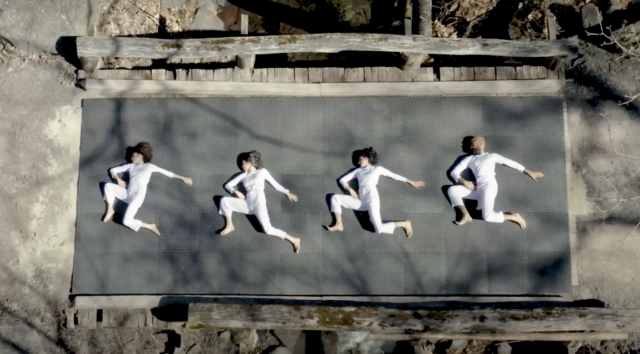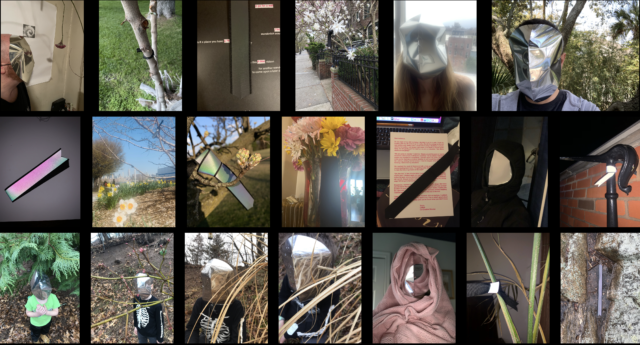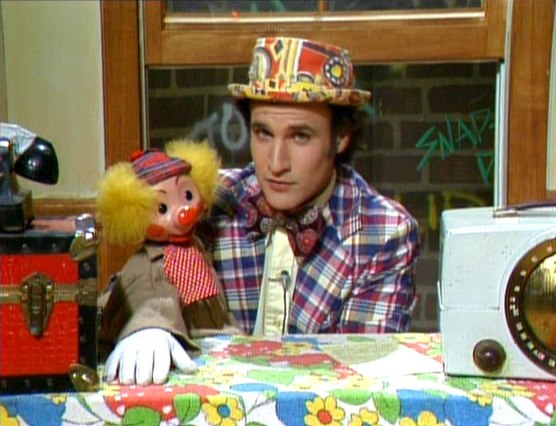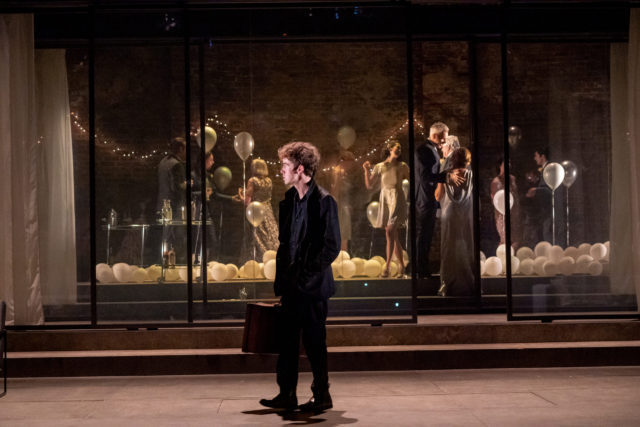
Alex Lawther is impressive as Hamlet in Robert Icke’s dazzling production at Park Ave. Armory (photo by Stephanie Berger)
HAMLET/ORESTEIA
Park Ave. Armory, Wade Thompson Drill Hall
643 Park Ave. at Sixty-Seventh St.
In repertory through August 13, $45-$199
www.armoryonpark.org/hamlet
www.armoryonpark.org/oresteia
An overwhelming sense of grief and severe family dysfunction link Robert Icke’s ingenious pairing of Hamlet and Oresteia, running in repertory at Park Ave. Armory through August 13. You might not immediately think of the two tragedies, one written in English by William Shakespeare around 1600 about an introspective Danish prince, the other a Greek trilogy penned by Aeschylus in the fifth century BCE focusing on the conflicted son of a powerful king, as theatrical brethren, but Icke masterfully weaves them together over the course of seven thrilling hours.
Following up his superb one-person reimagining of Henrik Ibsen’s Enemy of the People starring Ann Dowd in a pandemic-reconfigured Wade Thompson Drill Hall at the armory, Icke returns with this extremely satisfying duo, which tackle similar themes in these contemporary versions. Whereas Icke makes subtle tweaks to Hamlet, he institutes much heavier changes to Oresteia.
They both take place on Hildegard Bechtler’s expansive, relatively shallow horizontal set, with entrances at either side and a glassed-in back room with sliding doors that are alternately transparent, translucent, or opaque. For Hamlet, business chairs and a comfy L-shaped couch are brought on- and offstage in between rectangular marble stanchions, while for Oresteia, the furniture includes a long dinner table with benches, marble Greek pillars with exposed stone walls, and a large bathtub in the rear. Bechtler also designed the modern-day costumes, with intricate lighting by Natasha Chivers and sound by Tom Gibbons.
Hamlet, superbly played with a tender vulnerability by twenty-seven-year-old British actor Alex Lawther, is dismayed to find that his recently widowed mother, Gertrude (Jennifer Ehle), has married her late husband’s brother, Hamlet’s father, Claudius (Angus Wright), who is now the king of Denmark. The two seem very much in love, making out on the couch. But when Hamlet’s father’s ghost (David Rintoul), who appears on closed circuit security cameras wandering the empty, dungeonlike halls of Elsinore castle, tells his son that Claudius murdered him, Hamlet, who has been considering going back to school in Wittenberg, becomes obsessed with revenge, yet he lacks the resolve to take any kind of significant action in his life.
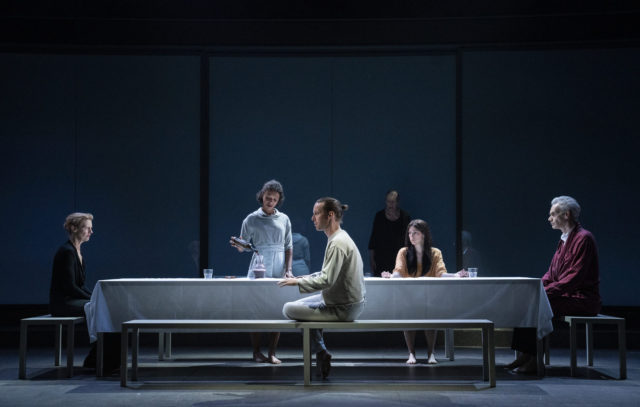
Klytemnestra (Anastasia Hille) and Agamemnon (Angus Wright) face each other across the family dinner table in Oresteia (photo by Joan Marcus)
Meanwhile, he seems destined to marry Ophelia (Kirsty Ryder), the daughter of Claudius’s chief adviser, Polonius (Peter Wight), and sister of the strong-willed Laertes (Luke Treadaway). Soon bodies are piling up, as Hamlet says, “with blood of fathers mothers daughters sons.”
In Oresteia, Agamemnon (Angus Wright), the king of Mycenae, is told by a seer, “By his hands alone. The child is the price. Fair winds.” Agamemnon and his brother, Menelaus (Peter Wight), need to sail their ships to Troy but are becalmed in Aulis, and Agamemnon interprets the prophecy to mean that he must kill his six-year-old daughter, Iphigenia (Elyana Faith Randolph or Alexis Rae Forlenza), in order to appease the gods and get the winds moving. The king is desperate to find another way, but both his brother and his herald, Talthybius (Josh Higgott), insist the deed must be done. When the queen, Klytemnestra (Anastasia Hille), deciphers the prophecy, she is of course furious, declaring, “You’re ill. You’re mad. To kill our child?” But she might not be able to stop him.
Ten years later, when Agamemnon returns from the war, bringing with him teenage captive Cassandra (Hara Yannas), he finds his family vastly changed. Bright young Orestes (Hudson Paul or Wesley Holloway) has grown into a conflicted teenager (Treadaway), daughter Electra (Tia Bannon) is jealous of Cassandra, and cousin Aegisthus (Angus Wright) has usurped Agamemnon’s place in the family. Soon bodies are piling up, and Klytemnestra warns Orestes, with more than a touch of wishful thinking, “You do not want blood on your hands.” Fathers, mothers, daughters, and sons are all in jeopardy.
Fear is central to both narratives. While Hamlet delivers his despair and anxiety directly to the audience in famous soliloquys, Oresteia unfolds in flashbacks as Orestes shares his memories with an unidentified woman (Ryder) who appears to be his therapist. Orestes tells her, “I watch it again, happening for the first time but — too late, too late to stop it. It pours out of me. But what if what’s next is — ? What if it’s better left sealed up, undisturbed?” The doctor responds, “We have to understand the truth.” Orestes: “What if it’s a dream? What if it’s a lie?” Doctor: “Then those lies reveal something about you. ‘Our self’ isn’t an absolute thing. It’s handfuls of memories and moments and people — and we form them into who we think we are. For most of us, it’s only partly true: one version of truth. A story.” Orestes: “A story. A story I’ve been through before. As a child. But I don’t know where it ends —”
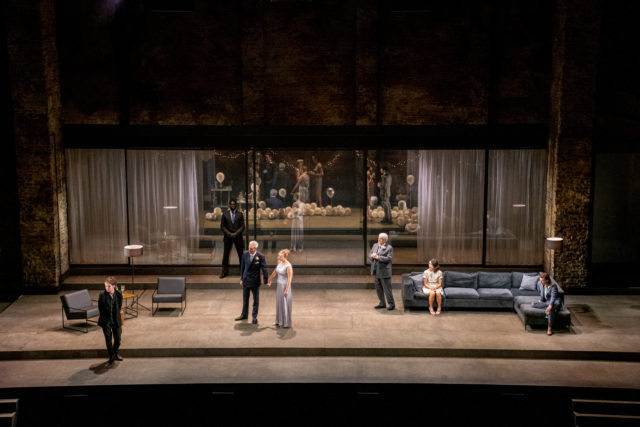
Claudius (Angus Wright) and Gertrude (Jennifer Ehle) hold hands, much to Hamlet’s (Alex Lawther) consternation (photo by Stephanie Berger)
Looking backward and forward while fearing the end is also a leitmotif for each play. “I try and look forward rather than backward,” Agamemnon says. Hamlet explains, “I hold it not honesty to have it thus set down / for yourself sir should be old as I am / if like a crab you could go backward.” At dinner, Electra confesses, “I know. I was late. I have apologized. Let’s all just move forward.” When Orestes insists to the doctor that he can’t remember the past, she implores, “You will remember something. We just have to begin. Travel back along the road, all the way back to where it began.” Hamlet says to his mother, “Repent what’s past / Avoid what is to come.”
The words “end” or “ending” are repeated throughout all seven hours. “It’s ending. It is ending,” Agamemnon says. Hamlet explains to Claudius, “We fat all creatures else to fat us and we fat ourselves for maggots / that’s the end.” Talthybius tells Agamemnon and Menelaus, “No one thinks this thing is close to the end. It’s cut in deep, it’s gone too far for that. And our enemy is prepared, planning years beyond — so there’s no road to the end of this that’s swift.” Ophelia, losing control of her wits, babbles to Laertes, “I would give you some violets but they withered all when my father died / they say he made a good end / and will he not come again? / and will he not come again? / no no he is dead.”
Both works also explore the power of dreams. Hamlet famously says, “To die to sleep / to sleep perchance to dream / ay, there’s the rub / for in that sleep of death what dreams may come / when we have shuffled off this mortal coil / must give us pause.” Orestes asks the doctor, “What happens when I dream? What is knotting together with what — what is being made? Fear and wishes and — and if it’s me, if it’s just inside me with no meaning elsewhere, can’t I create something better than this, can’t I choose imagined hope rather than imagined fear?” Shortly after Klytemnestra awakes from a bad dream, Cilissa (Marty Cruikshank), Orestes’s nurse, recalls of him as a baby, “He screamed and screamed at night. Never a good sleeper.”
Icke, who is only thirty-five and was an associate director with the Almeida in London from 2013 to 2019, is now the Ibsen artist in residence at Ivo van Hove’s Internationaal Theater Amsterdam, and he has picked up van Hove’s obsession with using cameras to present live feeds on screens. (The projections are by Tal Yarden for Hamlet and Tim Reid for Oresteia.) In addition to the video surveillance that reveals Hamlet’s father’s ghost, there are news reports about young Fortinbras leading Norway’s military marching toward Denmark; press interviews with Agamemnon; and Claudius closely watching The Mousetrap, the play-within-a-play in which Hamlet discloses to Claudius that he knows he murdered his father. In addition, the screens are used for countdowns, ticking away the seconds during fifteen-, ten-, and five-minute intermissions in Oresteia like a doomsday clock. Meanwhile, articles of evidence and the exact times of characters’ deaths are detailed above the set like breaking news.
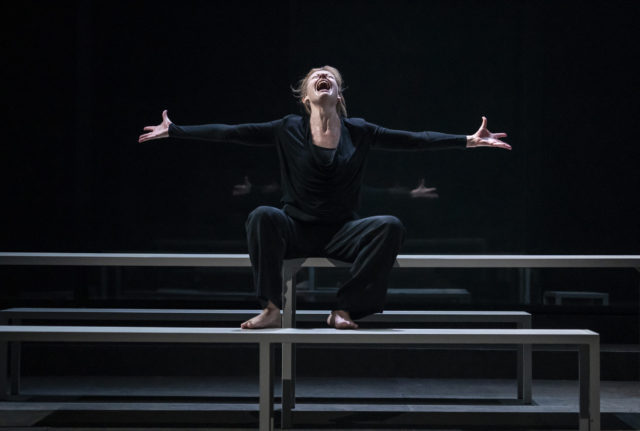
Klytemnestra (Anastasia Hille) can’t hold the pain inside any longer in Oresteia (photo by Joan Marcus)
Icke digs into 1960s music icons by featuring several Bob Dylan songs in Hamlet — one does not generally associate Dylan, and such tunes as Things Have Changed (“Standing on the gallows with my head in a noose / Any minute now I’m expecting all hell to break loose / People are crazy and times are strange / I’m locked in tight, I’m out of range”) and All Along the Watchtower (“There must be some kind of way outta here / Said the joker to the thief / There’s too much confusion / I can’t get no relief), as the soundtrack for a party with lots of dancing and balloons (of course, “Masters of War” would not exactly be the best choice either) — while Iphigenia sings verses from the Beach Boys’ “God Only Knows” in Oresteia (“God only knows what I’d be without you”).
The casting between the two plays is shrewdly resourceful. Wright is terrific as Claudius, Agamemnon, and Aegisthus, standing tall, speaking firmly, but not afraid to show the cracks in their armor. Peter Wright is stalwart as the loyal but ill-fated Polonius and Menelaus. Rintoul portrays the Player King and the ghost, haunting Claudius and Hamlet, respectively. Other key dualities that bring the works together include Bannon as Guildenstern and Electra, Treadaway as Laertes and Orestes, Abubakar as Marcellus and Calchas, Higgott as Horatio and Talthybius, Ryder as Ophelia and the doctor, Hara Yannas as Bernardo and Cassandra, and Athene Ross Waiton (in Hamlet only) as Francisco and the gravedigger, who makes a memorable appearance from under the stage, warbling Dylan’s “Sugar Baby.” Lia Williams was scheduled to play Gertrude and Klytemnestra but had to pull out after injuring her Achilles heel; Ehle and Hille are excellent as her respective replacements.
Both Hamlet and Orestes are onstage virtually the entire show, watching the proceedings when they’re not directly involved. They experience devastating loss that rips at their souls, and each has the opportunity to commit murder to avenge wrongdoing. Instead of wielding “a bare bodkin,” Hamlet puts a gun to Claudius’s head, while Orestes pulls a knife on one of his parents. But revenge will not necessarily relieve them of their deep trauma. “You must know your father lost a father / that father lost, lost his, and the survivor bound / in filial obligation for some term / to do obsequious sorrow / but to persever / in obstinate condolement is a course / of impious stubbornness / ’tis unmanly grief,” Claudius tells Hamlet. Referring to a murder in his family, the doctor tells Orestes, “You survived that trauma. We’re barely there in the moment it happens — we hardly feel it as it hollows us out — what hurts is the next second; awakening into what’s left — And I don’t think you’ve woken up. I’m not sure you want to wake up.” Orestes asks, “Why would I?” The doctor responds, “Fear. Of where you might be. Where you might really be.”
In a world turned upside down by a global pandemic that has killed nearly six and a half million people, Russia’s brutal invasion of Ukraine, climate change that is threatening the future of the planet, mass shootings in the United States committed with automatic assault weapons, and an insurrection that continues to jeopardize American democracy, many of us are afraid of where we might really be.
As Electra asks, “How do you mourn?” It’s a question we are all facing these days, in one way or another, a question brilliantly explored in Icke’s dueling plays.
